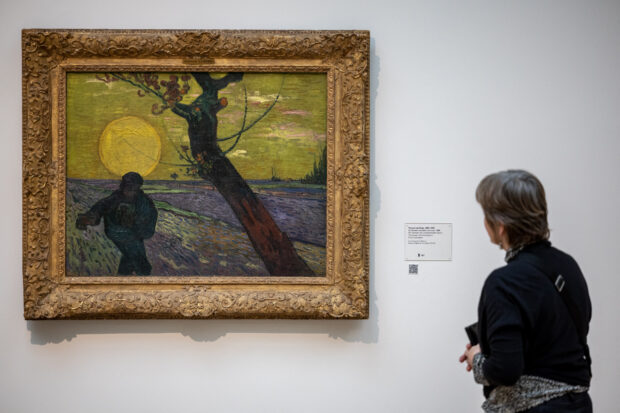Swiss museum to remove five paintings linked to Nazi looting

A picture taken on March 14, 2023 shows “The Sower with Setting Sun” 1888 a masterpiece by Vincent van Gogh, part of the Emil Buhrle Collection exhibited at the Kunsthaus Zurich. Kunsthaus Zurich, one of Switzerland’s top art museums, launched a new review aimed at clarifying whether any of its artworks might be cultural property looted by the Nazis. Ann Demeester, who took over as the museum’s director in January 2023, wants to tackle the thorny issue of provenance and art confiscated by Nazi Germany. (Photo by ARND WIEGMANN / AFP)
The Kunsthaus Zurich, one of Switzerland’s most prestigious art museums, has announced it will remove five paintings after a review of their provenance under new guidelines for dealing with artworks looted by the Nazis.
A sixth painting also came in for additional scrutiny, the foundation responsible for the Emil Buhrle Collection said, though it did not believe the new guidelines applied to the work.
The foundation’s namesake was a German-born arms dealer who made his fortune during World War II, and there have long been suspicions about the Nazi-era origins of one of Europe’s most prestigious private art collections.
“The Kunsthaus Zurich has been informed by the Foundation E.G. Buhrle Collection that the Foundation is seeking solutions with the legal successors of former owners for six works in the collection,” the museum said in a Friday statement.
“The Kunsthaus welcomes this approach, but in the interests of visitors very much regrets that five of the paintings will be removed from the Kunsthaus premises” by the foundation on Thursday, it added.
The paintings in question are by Gustave Courbet, Claude Monet, Henri de Toulouse-Lautrec, Vincent van Gogh and Paul Gauguin.
In a statement of its own, the foundation explained it had “subjected its artworks to a further assessment” of their provenance based on new best practices from the US State Department for dealing with Nazi-looted art.
For the five works being removed from the museum, “the Foundation will seek just and fair solutions with the descendants or other legal successors of the former owners.”
The foundation determined that “based on established facts,” a sixth painting by Edouard Manet “does not fall under the scope of the ‘Best Practices,'” though the case still merited “particular attention.”
“Due to the overall historical circumstances relating to the sale, the Foundation is prepared to offer a financial contribution to the estate of Max Silberberg in respect to the tragic destiny of the former owner,” it said.
The Kunsthaus has previously run into trouble showing the Buhrle collection, with critics last year saying its attempt to put the works in context did not focus enough on the fate of the art’s former Jewish owners.